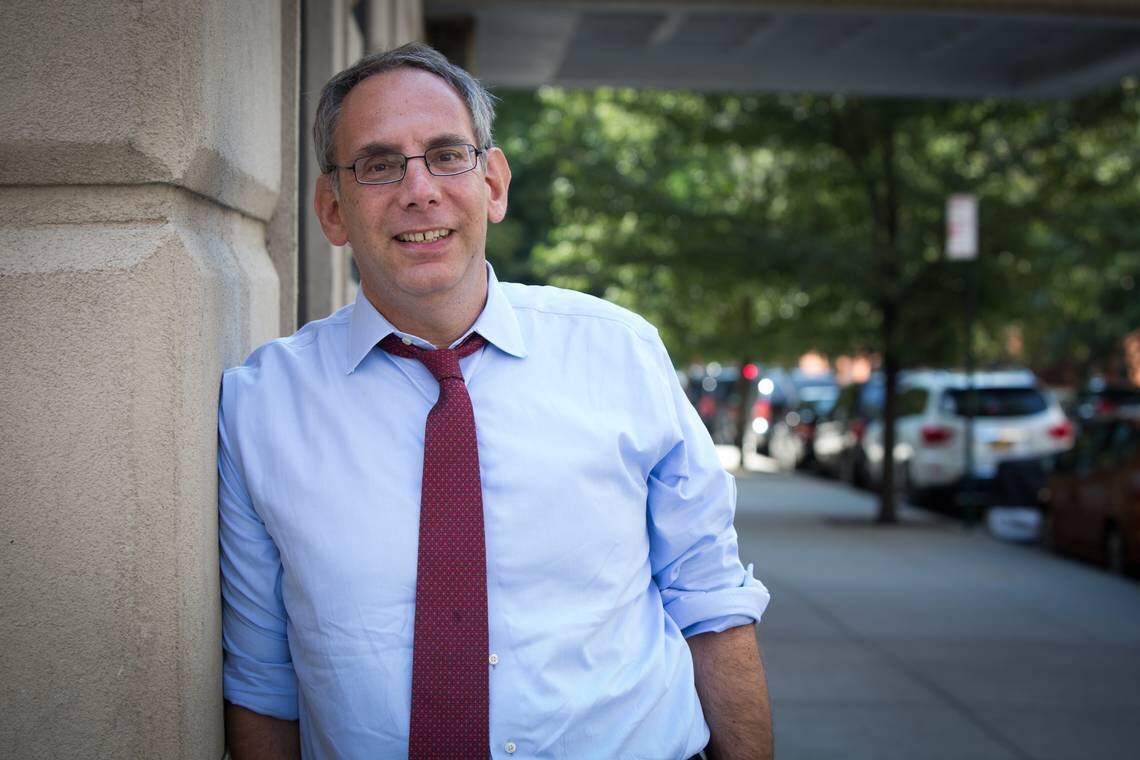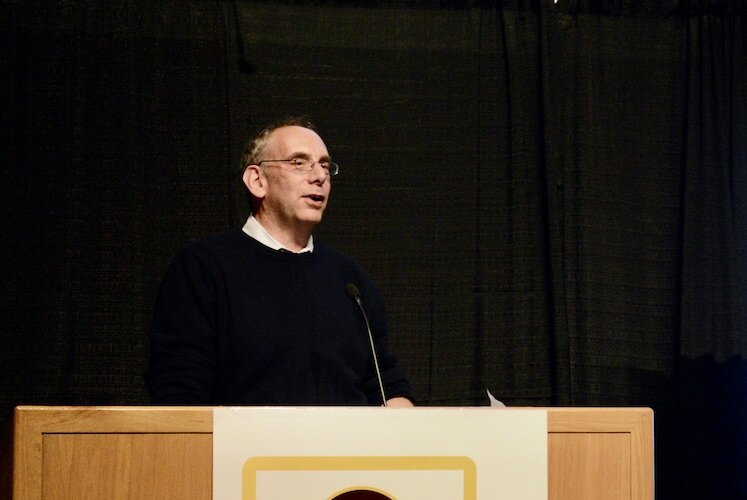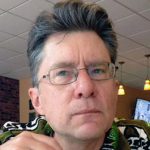StoryCorps goes in a new direction to help people realize what they have in common
Is it possible to get two strangers from opposite sides of the many divides in this country to talk, and not be at each other's throats? For StoryCorps Founder Dave Isay this is a necessity. "It's our dream that we convince the country that it's our patriotic duty to see the humanity in people with who you disagree."
The institution that’s gotten family and loved ones to open up to each other is now hoping to do the same with potential political/cultural enemies.
The reason: To help them realize they aren’t actually enemies.
Dave Isay, founder and president of StoryCorps, came to the Fetzer Center March 29 to talk about what happens when you get two people in a booth and record their interactions.
StoryCorps’ format resulted in countless hours of honest, human, and touching interactions.
Five years ago StoryCorps began work on One Small Step.
Could it be possible to get two strangers from opposite sides of the many divides in this country to talk, and not be at each other’s throats?
For Isay, this possibility is a necessity. “It’s our dream that we convince the country that it’s our patriotic duty to see the humanity in people with who you disagree,” he says.
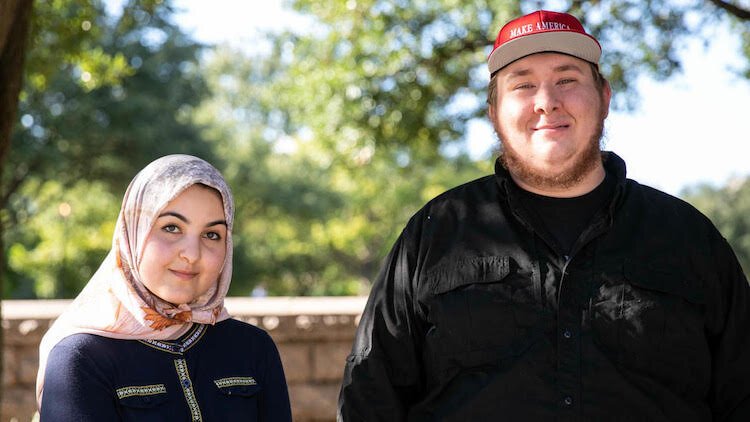
“Democracy can’t survive in a swamp of mutual contempt,” he says. “This is not about disagreeing, which is healthy. It’s about hating one another, and we know where that leads.”
No Jerry Springer/reality TV moments here
Isay opened his talk with a look at the original idea he had 18 years ago, in 2003. Take two people, related in some way, put them in a booth presented as “a sacred space,” and have them spend 40 minutes listening and asking questions.
StoryCorps has recorded between 650,000 to 700,000 people, “the largest collection of human voices ever gathered.” They all get filed away in the Library of Congress, and a selection are edited for broadcast on NPR’s “Morning Edition.”
In the early years of StoryCorps, Isay feared there could be a few “Jerry Springer moments” when he put relatives together and had them open up honestly. In all of the hundreds of thousands of recordings, “We’ve never seen that happen.”
He played a few animations of interviews, such an early one with a 12-year-old with Asperger’s syndrome interviewing his mother. The talk turned from his fascination with animals and how no one likes cockroaches, to how she coped with having him as her baby. It, like most StoryCorps recordings, is honest, humorous, touching — and has zero antagonistic outbursts, no family squabbles, and no one’s performing for the microphone.
“People cry when they listen to these things, not because they’re sad, but because you’re hearing something that’s authentic and out of love. And it’s just so rare, you feel you’re kind of walking on holy ground,” he says.
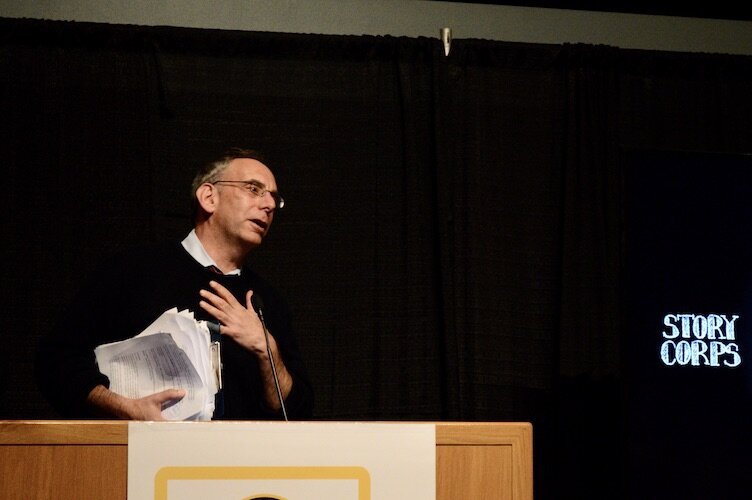
Isay says that people tell him StoryCorps teaches “a version of the Ann Frank quote, that people are basically good…. It’s the opposite of reality TV. Nobody comes to StoryCorps to get rich, to get famous. It’s just an act of generosity, of love.”
The “moonshot” — One Small Step
Around six years ago, he and others in StoryCorps became “very concerned about the great rift in connection.”
“We’re a non-profit in the connection business,” so they set out to look at ways to pull “us out of this social media, media-induced haze we’re all in, that I think has brought the country to a very dangerous place,” Isay says.
The US is in a state of “toxic polarization,” with polls showing “that around 20% of the country, Democrats and Republicans, now say that if people on the other side of the aisle were to die, that’d be a good thing for the country,” he says.
Though Isay didn’t use the word “genocide,” he brought up Putin, Hitler and the Holocaust. Rhetoric that’s similar to Hitler’s calling groups of citizens “less than human, ‘untermensch,'” is floating around the U.S. media and coming out of elected officials. “It’s slavery, it’s Rwanda …. We are moving in that direction in the country, now.”
Starting with StoryCorps’ “Hippocratic oath, do no harm to participants,” their chief program officer Lisa Gale led an effort to design a new interview. “We spent many years experimenting with putting strangers together for the first time, across the political divides, and have a StoryCorps conversation, not about politics but to just get to know each other as human beings.”
The core theory is, “it’s hard to hate up-close”
Isay played a StoryCorps interview that helped inspire the One Small Step work. Joseph Weidknecht and Amina Amdeen talked about the time they met at an anti-Trump march in Austin, Texas, just after the 2016 election.
He had shown up with pro-Trump counter-protesters. She was anti.
She realized the atmosphere was getting threatening, then saw someone snatch the MAGA hat from his head. “That’s the point when something kind of snapped inside of me, because I wear a Muslim hijab, and I’ve been in situations where people have tried to snatch it off my head. And I rushed towards you, and I just started screaming, ‘Leave him alone! Give him that back!'”
He tells her, “We couldn’t be any further apart as a people, and yet you had this common ‘that’s not okay’ moment.”
They then talk about feeling like outsiders. At 10, she arrived in the US from Baghdad and stood out at school as a Muslim girl. He was homeschooled, and the one year he went to public school he got into three fights, “and lost all of them.”
Now adults, the political/cultural divide affects their relationships. His voice breaking a bit, Weidknecht says, “I actually lost a lot of friends because of this election, because of my political stance. So, I hope I can be the reason that someone decides to talk to someone as opposed to just cutting them out of their life or blocking them on Twitter.”
Threads of connection, to make a rope
One Small Step is based on research, starting with one of the most studied theories in the history of psychology,” Isay says.
That’s contact theory, developed by Gordon Allport, which says that “under very specific circumstances, if you put enemies together in a visceral one-on-one experience, at the end of that experience that hate can melt away, and they can see each other in a new way. If you do it wrong, you can make things much worse. If you do it right, you can see something really special,” Isay says.
People can sign up to participate, then fill out a questionnaire about their politics and their lives. They get matched with a partner who has something in common that neither knows about.
They’re reminded that this talk is not a debate. “Again, we suggest that they don’t talk about politics. We haven’t found that to be particularly fruitful,” Isay says.
They hope to create connections across the divide, “one thread at a time. If we get enough threads together, we can have a rope that can hopefully pull us out of this abyss that we’re standing on.”
Isay showed a One Small Step interview where a hot topic was brought up, but the two participants managed to find something to agree on.
Austin Suellentrop tells Nicole Watkins that he and his church youth group go to Washington D.C. for the March on Life every year.
“Somehow, because I’m seen as someone who’d like to see a world where abortion is no longer an option, because of that one stance I’m now somehow this radical evangelical avid Trump supporter. And the thing that drives my belief there (abortion) is also the same thing that drives my belief that we should take care of the abandoned refugee at the border, we should take care of the poor and sick in our neighborhoods.”
Nicole says, “please don’t run out of the room — I work for Planned Parenthood.”
Both share uncomfortable laughs. “That’ gets my blood going a little bit,” he says.
But they both agree with what he says, “None of us are simple enough to be just one bio. We’re all too darn complicated for that.”
She says he’s a father, a husband, a member of his community, “You are all these things, and I think if we can remember that when we have these conversations I think we’ll get somewhere.”
One Small Step is staffed and advised by “social psychologists and people who deal with conflict resolution, and pollsters and others testing this content,” Isay says.
The work is focused on four cities: Birmingham, Ala..; Wichita, Kan., Shreveport, La., and Richmond, Va. Since launching in April of last year. The waiting list for participants has grown to around 10,000.
Isay sees this as a “public health campaign.” One of their advisors, Peter Coleman, an expert on conflict theory, has pointed out “what happens when you have a country that is stuck in affective and toxic polarization,” Isay says. The results are “political gridlock, which obviously we’re seeing. Violence, which also starts slowly then proceeds very quickly. And mental health problems. Obviously, it causes enormous despair when you think your neighbors are more dangerous than our traditional international adversaries, which now 50% of the country believes, that the opposite side of the political divide poses a greater threat than the Russians or Chinese.”
Will the One Small Step effort actually cool tempers enough to see a nationwide change? “We know that it’s a moon-shot,” Isay says. “There’s a multi-billion dollar hate-industrial complex” — in traditional media and social media — “where people are making money getting us to hate each other.”
“But we are taking a shot at it, because our country’s worth it.”
Isay was brought to Kalamazoo by WMU’s We Talk program, whose purpose is to “foster a campus culture of responsible and respectful civic, social, political and policy engagement,” and The Fetzer Institute, a major supporter of StoryCorps.

